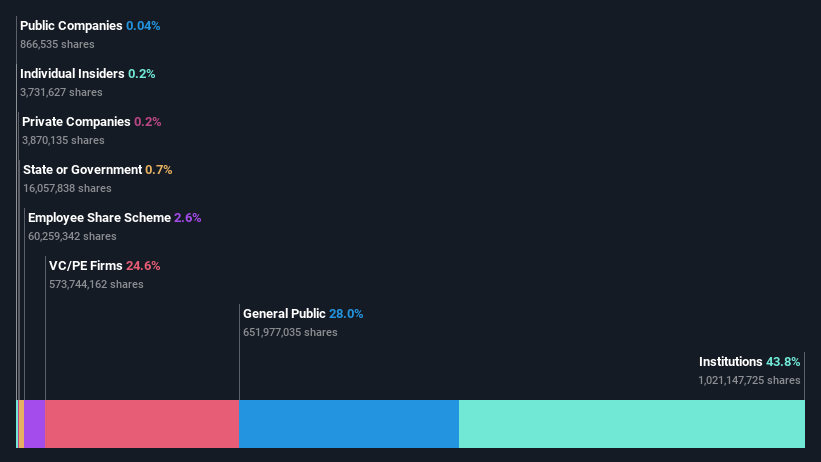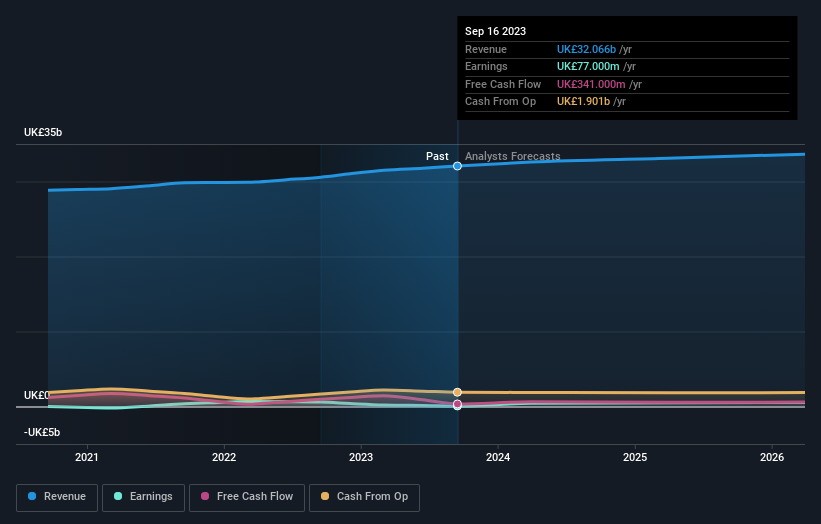With 44% institutional ownership, J Sainsbury plc (LON:SBRY) is a favorite amongst the big guns
Key Insights
Given the large stake in the stock by institutions, J Sainsbury's stock price might be vulnerable to their trading decisions
A total of 12 investors have a majority stake in the company with 50% ownership
Ownership research along with analyst forecasts data help provide a good understanding of opportunities in a stock
Every investor in J Sainsbury plc (LON:SBRY) should be aware of the most powerful shareholder groups. We can see that institutions own the lion's share in the company with 44% ownership. Put another way, the group faces the maximum upside potential (or downside risk).
Given the vast amount of money and research capacities at their disposal, institutional ownership tends to carry a lot of weight, especially with individual investors. Therefore, a good portion of institutional money invested in the company is usually a huge vote of confidence on its future.
Let's take a closer look to see what the different types of shareholders can tell us about J Sainsbury.
Check out our latest analysis for J Sainsbury
What Does The Institutional Ownership Tell Us About J Sainsbury?
Institutional investors commonly compare their own returns to the returns of a commonly followed index. So they generally do consider buying larger companies that are included in the relevant benchmark index.
As you can see, institutional investors have a fair amount of stake in J Sainsbury. This can indicate that the company has a certain degree of credibility in the investment community. However, it is best to be wary of relying on the supposed validation that comes with institutional investors. They too, get it wrong sometimes. If multiple institutions change their view on a stock at the same time, you could see the share price drop fast. It's therefore worth looking at J Sainsbury's earnings history below. Of course, the future is what really matters.
Hedge funds don't have many shares in J Sainsbury. Qatar Holding LLC is currently the company's largest shareholder with 14% of shares outstanding. With 10% and 6.2% of the shares outstanding respectively, Vesa Equity Investment S.à R.L. and Pzena Investment Management, Inc. are the second and third largest shareholders.
Looking at the shareholder registry, we can see that 50% of the ownership is controlled by the top 12 shareholders, meaning that no single shareholder has a majority interest in the ownership.
While studying institutional ownership for a company can add value to your research, it is also a good practice to research analyst recommendations to get a deeper understand of a stock's expected performance. There are a reasonable number of analysts covering the stock, so it might be useful to find out their aggregate view on the future.
Insider Ownership Of J Sainsbury
The definition of company insiders can be subjective and does vary between jurisdictions. Our data reflects individual insiders, capturing board members at the very least. Company management run the business, but the CEO will answer to the board, even if he or she is a member of it.
Insider ownership is positive when it signals leadership are thinking like the true owners of the company. However, high insider ownership can also give immense power to a small group within the company. This can be negative in some circumstances.
Our data suggests that insiders own under 1% of J Sainsbury plc in their own names. Keep in mind that it's a big company, and the insiders own UK£9.5m worth of shares. The absolute value might be more important than the proportional share. It is good to see board members owning shares, but it might be worth checking if those insiders have been buying.
General Public Ownership
The general public, who are usually individual investors, hold a 28% stake in J Sainsbury. This size of ownership, while considerable, may not be enough to change company policy if the decision is not in sync with other large shareholders.
Private Equity Ownership
With a stake of 25%, private equity firms could influence the J Sainsbury board. Sometimes we see private equity stick around for the long term, but generally speaking they have a shorter investment horizon and -- as the name suggests -- don't invest in public companies much. After some time they may look to sell and redeploy capital elsewhere.
Next Steps:
It's always worth thinking about the different groups who own shares in a company. But to understand J Sainsbury better, we need to consider many other factors. To that end, you should learn about the 3 warning signs we've spotted with J Sainsbury (including 1 which shouldn't be ignored) .
But ultimately it is the future, not the past, that will determine how well the owners of this business will do. Therefore we think it advisable to take a look at this free report showing whether analysts are predicting a brighter future.
NB: Figures in this article are calculated using data from the last twelve months, which refer to the 12-month period ending on the last date of the month the financial statement is dated. This may not be consistent with full year annual report figures.
Have feedback on this article? Concerned about the content? Get in touch with us directly. Alternatively, email editorial-team (at) simplywallst.com.
This article by Simply Wall St is general in nature. We provide commentary based on historical data and analyst forecasts only using an unbiased methodology and our articles are not intended to be financial advice. It does not constitute a recommendation to buy or sell any stock, and does not take account of your objectives, or your financial situation. We aim to bring you long-term focused analysis driven by fundamental data. Note that our analysis may not factor in the latest price-sensitive company announcements or qualitative material. Simply Wall St has no position in any stocks mentioned.


